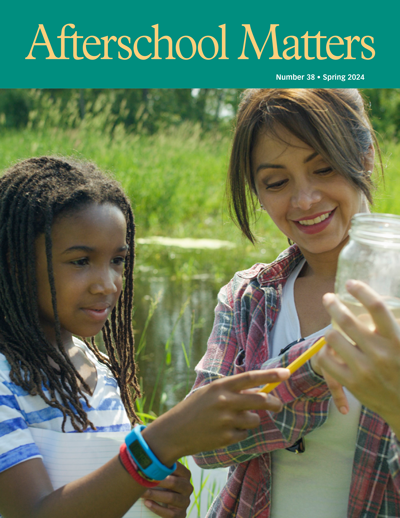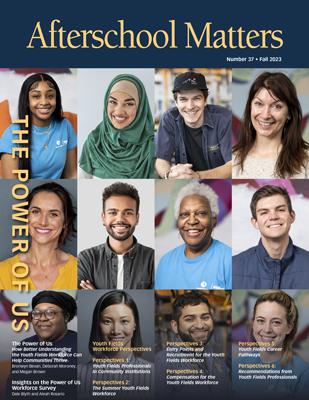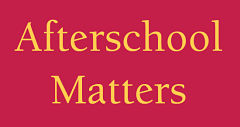By Emma Carey
When I first heard about joining science, technology, engineering, and math into the acronym STEM, it just sounded like a list to me. I thought, “That’s nice, that multiple subjects are being taught together. But I still only really like science.” I wondered why these topics were lumped together, and what exactly the connections were among the four subjects, beyond the vague connections of numbers and data. And, why, all of a sudden, did my interest in one subject suddenly mean I might be working with all of them?
Continue Reading
The Roles of Informal Learning Organizations in a Literacy Ecosystem
By Meghan C. Orman & Shannon B. Wanless
Literacy development is important for children’s academic, social, and economic well-being (Annie E. Casey Foundation, 2019). Yet racial inequities in reading proficiency persist: 82 percent of Black fourth graders did not read proficiently in 2019, compared to 55 percent of White students (National Assessment of Educational Progress, 2019).
Continue Reading
A Review of Programs for Low-Income Adolescents
By Rebecca S. Levine
As communities grapple with the harmful, inequitable effects of the COVID-19 pandemic, which have been particularly hard on low-income and marginalized youth, renewed attention has been directed toward how out-of-school time (OST) programs can help youth reconnect and re-engage (Afterschool Alliance, 2021; Stanford, 2022).
Continue Reading
By Lindsay R. Ruhr & Laura Danforth
Abundant research has covered the benefits of and barriers to partnerships between schools and community-based organizations (CBOs; Sanders, 2001; Valli et al., 2016). Such partnerships can be defined as “connections between schools and community individuals, organizations, and businesses that are forged to promote students’ social, emotional, physical, and intellectual development” (Sanders, 2001, p. 20).
Continue Reading
An Innovative Approach to Prevention and Early Intervention
By Erica D. Kelsey
The Centers for Disease Control and Prevention (CDC) suggest that 1 in 5 children and 1 in 2 adolescents experience a mental or behavioral health disorder. CDC studies show that people of color and other marginalized groups have higher rates of behavioral health challenges than White people (2022).
Continue Reading
Youth Development in a High School STEM Afterschool Program
By Amy Lang
“I would never have thought that I could go into beekeeping as a full-time commitment. It was after learning about the large impacts (good and bad) that insects have on agriculture and the environment that I could fully comprehend the scope a job with bees could cover. Though I do not know exactly what I want to be, I know that I want to pursue a career where I can work with bees and plants. I have been drawn to help others learn about the importance of pollinators and develop a passion for the environment like myself. I am now an active member of the Association of Southern Maryland Beekeepers, and have been involved in many projects teaching others about the importance of pollinators through this program.”
Continue Reading
Youths’ Perceptions of Meaningfulness and Future Orientation in Summer Youth Employment Contexts
By Denise Jones, Zaida Pearson, Deanna C. E. Sinex, Jeremiah Nash, Aiwen Chen, & Dennis F. Jones
Summer is a unique time for students to extend the gains made during the school year by engaging in opportunities that support their growth and development. For younger teens, these opportunities may focus on developing relationships and competence; older youth may want to gain experience in the labor market (Afterschool Alliance, 2010).
Continue Reading
A Framework for Making Black Girls’ Lives Matter
By Dyann C. Logwood
In the wake of current sociopolitical movements, research on the lives of Black girls and women is gaining momentum. However, studies providing Black girls space to voice their experiences within learning and afterschool environments remain a crucial—and often ignored—component of this conversation.
Continue Reading
Researcher’s Notebook
By Shannon Macalingay
As part of NIOST’s work with summer learning programs in Massachusetts, researchers conducted semi-structured interviews with 11 youth interns working in five summer program sites across the state. Sites were grantees of the 21st Century Community Learning Centers program, which is managed by the Massachusetts Department of Elementary and Secondary Education.
Continue Reading
Researcher’s Notebook
By Greer Marshall
In 2019, NIOST began working on the Philadelphia Out-of-School Time Literacy and Quality Improvement Initiative (OSTLit), which continued through December 2023. During these four years, with funding from the William Penn Foundation, NIOST trained program leaders and staff at 10 Philadelphia afterschool programs to facilitate literacy skill-building experiences for elementary school aged children. NIOST investigated the impacts of this support by observing program practices and interviewing program staff.
Continue Reading



